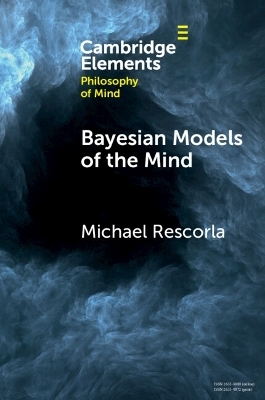
Bayesian Models of the Mind
Seiten
2024
Cambridge University Press (Verlag)
978-1-108-95829-5 (ISBN)
Cambridge University Press (Verlag)
978-1-108-95829-5 (ISBN)
- Noch nicht erschienen (ca. Dezember 2024)
- Portofrei ab CHF 40
- Auch auf Rechnung
- Artikel merken
Bayesian decision theory is a mathematical framework used by cognitive scientists to model reasoning and decision-making under uncertain conditions. It has been used to describe the human mind, revealing mental processes like perception, motor control, and navigation. This Element provides an introduction to Bayesian cognitive science.
Bayesian decision theory is a mathematical framework that models reasoning and decision-making under uncertain conditions. The Bayesian paradigm originated as a theory of how people should operate, not a theory of how they actually operate. Nevertheless, cognitive scientists increasingly use it to describe the actual workings of the human mind. Over the past few decades, cognitive science has produced impressive Bayesian models of mental activity. The models postulate that certain mental processes conform, or approximately conform, to Bayesian norms. Bayesian models offered within cognitive science have illuminated numerous mental phenomena, such as perception, motor control, and navigation. This Element provides a self-contained introduction to the foundations of Bayesian cognitive science. It then explores what we can learn about the mind from Bayesian models offered by cognitive scientists.
Bayesian decision theory is a mathematical framework that models reasoning and decision-making under uncertain conditions. The Bayesian paradigm originated as a theory of how people should operate, not a theory of how they actually operate. Nevertheless, cognitive scientists increasingly use it to describe the actual workings of the human mind. Over the past few decades, cognitive science has produced impressive Bayesian models of mental activity. The models postulate that certain mental processes conform, or approximately conform, to Bayesian norms. Bayesian models offered within cognitive science have illuminated numerous mental phenomena, such as perception, motor control, and navigation. This Element provides a self-contained introduction to the foundations of Bayesian cognitive science. It then explores what we can learn about the mind from Bayesian models offered by cognitive scientists.
1. Introduction; 2. The probability calculus; 3. Bayesian decision theory; 4. Bayesian cognitive science; 5. Realism and instrumentalism; 6. Mental representation; 7. Anti-representationalism; 8. Conclusion; 9. Appendix: Foundations of probability theory.
| Erscheint lt. Verlag | 31.12.2024 |
|---|---|
| Reihe/Serie | Elements in Philosophy of Mind |
| Zusatzinfo | Worked examples or Exercises |
| Verlagsort | Cambridge |
| Sprache | englisch |
| Themenwelt | Geisteswissenschaften ► Philosophie |
| ISBN-10 | 1-108-95829-X / 110895829X |
| ISBN-13 | 978-1-108-95829-5 / 9781108958295 |
| Zustand | Neuware |
| Informationen gemäß Produktsicherheitsverordnung (GPSR) | |
| Haben Sie eine Frage zum Produkt? |
Mehr entdecken
aus dem Bereich
aus dem Bereich
wie Philosophie uns helfen kann, unseren Weg zu finden
Buch | Hardcover (2023)
dtv Verlagsgesellschaft
CHF 39,90


